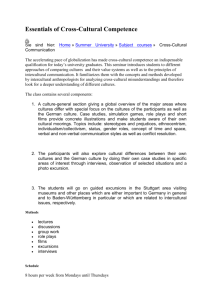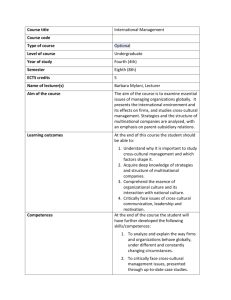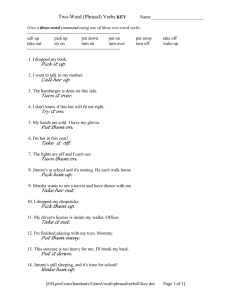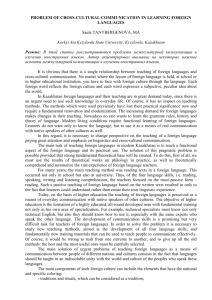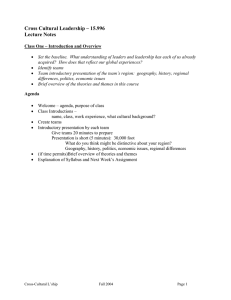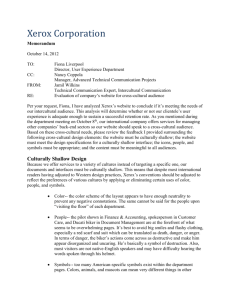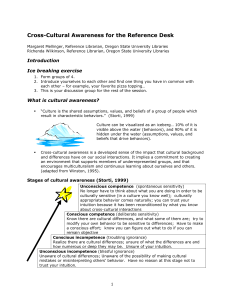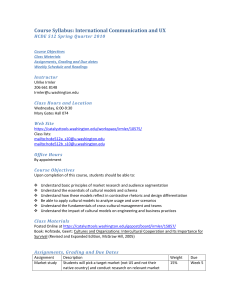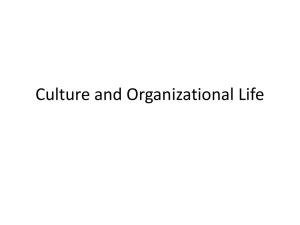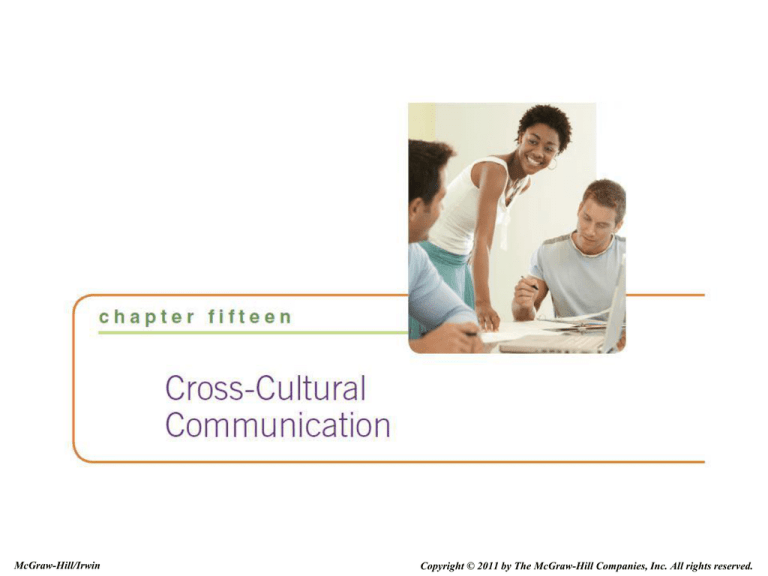
McGraw-Hill/Irwin
Copyright © 2011 by The McGraw-Hill Companies, Inc. All rights reserved.
Overview
• The Importance of Cross-Cultural
Communication
• Dimensions of Cultural Difference
– Body Positions and Movements
– Factors of Human Relationships
• Problems of Language
• Advice for Communicating across Cultures
• Resources for Cross-Cultural Communication
15-2
Why Cross-Cultural Communication?
•
•
•
•
Technological advances have made doing
business more global.
Understanding those who buy and use a
company’s products or services helps you design
ones that fit your customers’ needs.
Successful communication improves
productivity and creates a comfortable
workplace.
Communicating with those from other cultures
enriches your business and personal life.
15-3
Background on Culture:
Questions for Discussion
• What is “culture”?
• What kinds of factors have influenced national
cultures?
• How have the Internet and increasing global
trade affected cultural differences?
• Why are people able to do business across
different cultures? What do businesspeople have
in common the world over?
• What is ethnocentrism and how does it impair
cross-cultural business relations?
15-4
Different Meanings of Body Language
•
•
•
•
•
•
The body (bowing, standing)
The head
The hands
A smile
A handshake
Others you know of?
15-5
Factors of Human Relationships
•
•
•
•
•
•
•
Time
Space
Odors
Frankness
Intimacy
Values
Expression of Emotion
15-6
Values and Communication:
Three Theoretical Frames
• Edward T. Hall
– High-Context versus Low-Context
• Geert Hofstede
–
–
–
–
–
Power Distance
Individualism vs. Collectivism
Masculinity vs. Femininity
Uncertainty Avoidance
Long-Term vs. Short-Term Orientation
• Richard D. Lewis
– Linear-Actives, Multi-Actives, and Reactives
15-7
Problems of Language
• Lack of Language Equivalency
• Difficulties with English
– Multiple meanings of words
– Two-word verbs
– Culturally derived words/phrases
15-8
Examples of Language Inequivalencies:
Words with No English Counterparts
• Deroulement (French): an unfolding, how
things happen
• Fahrvergnugen (German): joy of driving
• Makulit (Filipino): from a root word that
means “repetitive”; refers to a type of pest or
stubborn person
• Ringi (Japanese): reaching a decision via a
document circulated to all employees
15-9
Multiple Meanings of Words
• Run
• Fast
• Ring
15-10
Substitutes for Two-Word Verbs
Two-word Verb
Substitute
act out
demonstrate
keyed up
excited, nervous
live down
remove, overcome
go after
pursue
get around
prevent, avoid
tie down
hold, secure
track down
search, find
15-11
Culturally Derived Expressions
• Slang
– We’ll have to call in the geek squad.”
• Metaphors
– “Can you give me a ballpark figure?”
– “Let’s meet so we can get on the same page.”
• Idioms and Colloquialisms
– “Hang in there!”
– “I hope I didn’t come across as impatient.”
15-12
Sample US Colloquialisms to Avoid
•
•
•
•
•
•
burn your bridges
cold turkey
doggie bag
fat chance
gravy train
have your cake and
eat it too
• in a nutshell
• let the cat out of the bag
• pot calling the kettle
black
• pull no punches
• stick in the mud through
thick and thin
• tie the knot
• tighten one’s belt
• up a tree
• walk on air
• wheel and deal
• worth one’s salt
15-13
Advice for Communicating
Cross-Culturally
•
•
•
•
Do your research.
Know yourself and your company.
Be aware—and wary—of stereotypes.
Adapt your English to your audience.
– Talk or write as simply and clearly as possible.
– Word questions carefully.
– Use continuous confirmation.
• Be open to change.
15-14
15-15
15-16
15-17

